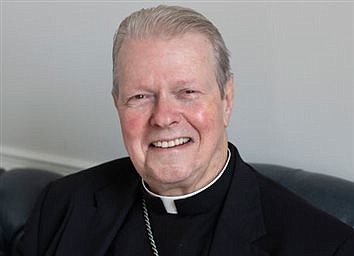February 15, 2023 at 2:55 p.m.
Often I encounter persons who suffer from deep feelings of anxiety, depression, lack of self-esteem and emptiness. Sometimes they ask me to help them find out who their true self is. It seems that their experience of sadness, fear, hopelessness or loneliness — whatever the unwelcome feelings may be — are making them ill, spiritually and even physically. Maybe they cannot even express this malaise in words and struggle to find someone to help them or just listen. I think of the plight of survivors of various forms of abuse, perhaps even many years ago, who may not even remember it. Bad experiences in childhood years, whether they occurred in school, church, the playground or at home, may leave scars, toxic patterns of painful memories, etched in like tattoos, that may not even be accessible to their immediate consciousness.
Over my years of ministry in the Tribunal of the Diocese of Brooklyn, where many dear people shared their painful experiences in marriages that were not working out, I learned the crucial importance of coming to terms with family of origin issues. Taking a cue from one of the psychiatric experts with whom we collaborated, I would often ask the question, “what did you learn in marriage school.” Not surprisingly, a person would look at me quizzically wondering, no doubt, what I meant by marriage school. There are no schools in which to learn about marriage, like one might with accounting, engineering or programming. But there are and they are attended over many years.
What we learned in our families of origins about how men and women treat one another, what it means to be a man or a woman, how one handles anger, stress, sensual desires, money, alcohol, screen time, in-laws, neighbors — to name only a few — are witnessed by a child growing up in this environment. It may be too much to say we are our parents, but in most cases the apple does not fall far from the tree, as the saying goes.
How often do we reflect how one suffering from a deep father-wound, however it may have been received, may transfer that unresolved issue to other relationships involving authority figures. The Church itself is often referred to as a “mother.” One’s relationship with one’s own mother may have a huge impact on how the person connects with the Church or not.
Please understand that I am not promoting, let alone suggesting, that “it’s all my parents’ fault” if I am having trouble in my relationships, with both adults and minors, which have much to do with how I even understand my own identity. I speak only from what I have witnessed, and many who work with people in the counseling and healing professions, see day after day. It is not just in negative ways that our formative years affect our present lives. Saint Térèse de Lisieux, for example, had a profoundly tender and loving bond with her father, however short. Unfortunately, he developed dementia when she was still a minor, which left deep feelings of hurt in her sensitive heart. Nonetheless, the way the Saint speaks of her relationship with God, in the most trusting and intimate terms, seems most likely to have been enhanced by her conviction of the authenticity of that father-love she had known with such conviction and gratitude. From her writings, one sees a life lived in almost continual joy, celebrated in the presence of God’s fatherly love.
I have often asked a person who is suffering from very unwelcome feelings, when was the last time you can remember feeling joy? What or who made you feel this way? I am not so much talking about just pleasure, like chowing down on an empty stomach, but more like planning, preparing and sharing a meal with friends and loved ones, something that leaves a lasting glow, not just a passing gratification. St. Ignatius identified this experience of the joy that lasts even after the actual experience as a way of knowing it comes from the right spirit.
God wants our happiness. One way of discovering what brings us joy is to ask myself what I enjoy doing every day or as often as I can. What or who brings joy to my life and leaves me feeling good after? Again, I say joy, not just a passing pleasure. The Mass can and should be a great source of joy if I give myself the chance to prepare, listen, participate and even mingle after with my family of faith. The Church is very much a family of families and a family for those without or apart from their families. I often worry a bit about regular “church people,” those who may be very actively involved in the business of helping others attend Mass and really pray it. Ushers, sacristans, even musicians who may have to concentrate on the performance may not always have the opportunity to really celebrate. Even priests and deacons can find themselves distracted by their roles — or even members of the congregation itself — and lose touch with their central role as prayers among prayers.
Part of really knowing oneself is to “discover” oneself in one’s joy and peace. What troubles, depresses or saddens one may not truly be what that person is. Certainly, it is not God’s wish that anyone live that way. Whoever may have unleashed the demons that may haunt one — be they from the past or present, hidden or manifest, they need to be identified and expelled by the power of God’s all-forgiving, all-embracing love.
Often it is necessary to seek professional counseling to help identify those negative forces. But since they are influences that affect not only our minds and memories but our spirits, a holistic approach is entirely necessary. Nothing fulfills the needs of our soul hunger more than prayer and the sacramental life of the Church. With Lent fast approaching, it is a good time to resolve to embrace the healing powers of this season of grace, with all of the wonderful, spirit-filling graces from prayer, fasting, almsgiving and the sacraments. In particular, beginning with a good confession, a joyful celebrating of God’s healing love, the Sacrament of Peace, is a way to blaze a path for the healing powers of grace. Lent itself becomes a season to celebrate the joy of the Lord who wants to enter the wounded soul, and occupy his rightful place on the throne of our heart. Is this not the peace we need?
@AlbBishopEd
250 X 250 AD
250 X 250 AD
Events
250 X 250 AD






Comments:
You must login to comment.